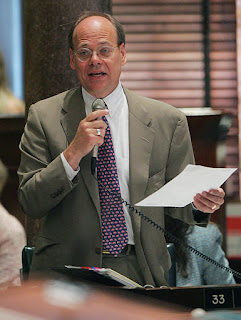
by Sandra Plasse
Congressman Steve Cohen is the sponsor of the bill passed by The House of Representatives against foreign libel suits. (AP Photo © 2005 John Russel)
Congress was prompted by an American author, Rachel Ehrenfeld, to propose the bill in order to protect citizens from "libel tourism." If the bill passes through Senate, a foreign libel judgment will only be maintained in the U.S. if it coincides with the same freedom of speech and press guaranteed by the U.S. Constitution.The House of Representatives passed the bill last weekend that, in effect,will protect the U.S. media from an overseas court using a U.S.court to enforce any overseas’ judgment, according to The Reporters Committee for Freedom of the Press. The bill, H.R. 6146, prohibits the “recognition and enforcement of foreign defamation judgments.” The bill’s sponsor is Congressman Steve Cohen (D-Tenn).
Ehrenfeld wrote a book in 2003 called Funding Evil: How Terrorism is Financed and How to Stop It. Khalid Salim Bin Mahfouz sued Ehrenfeld for libel in the U.K. because the book accused him of funding terrorism, according to Publishers Weekly.
Although it wasn’t published in the U.K., citizens purchased copies of the book over the Internet. An English court demanded retractions by Ehrenfeld but when she refused Mahfouz sued her. She decided not to contest the suit in an English court because “under English law, it wasn’t enough that I could prove that I had written what my sources told me, but I would have had to prove the underlying truth of the accusations as well. No one can meet that standard,” she told The New Yorker.
She appealed the case in New York and it eventually went to The New York Court of Appeals. The court said it couldn't rule because the case was out of it's jurisdiction and Mahfouz didn't fall under the “long-arm” clause for New York. In an editorial published by The New York Times, Adam Cohen writes that libel tourism is a threat to robust free speech. "The result is what lawyers call a “chilling effect” — authors and publishers may avoid taking on some subjects, or challenging powerful interests."

No comments:
Post a Comment